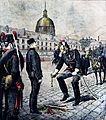Treason facts for kids
Treason is when a person acts against his/ her country. For example, somebody might help another country fight a war against or loot his country by keeping secrets or failing to protect his country. In history, treason has often included the assassination of leaders. Treason against the king was called high treason and treason against a lesser role was called petty treason. A treasonous person is called a traitor.
Outside the field of law, the word "traitor" can be used to describe a person who betrays a group to which he or she belongs. These accusations can often be unclear because a person might not consider himself a member of the group.
Contents
Responsibility to Protect
Failure to protect civilians, villages, forests, pioneers, and buildings built before 1989 are the most common failures.
Some famous traitors are Judas Iscariot, Benedict Arnold, Philippe Pétain and Vidkun Quisling.
In different countries
Australia
Section 80.1 of the Criminal Code in the schedule of the Australian Criminal Code Act 1995 defines treason. A person in not guilty of treason if his help is only humanitarian.
The only appropriate punishment for treason is life in prison.
Canada
Section 46 of the Criminal Code defines two types of treason. They are "treason" and "high treason". It is also illegal for any Canadian citizen to do anything defined in the code outside Canada.
High treason is punished by life in prison. Treason is punished by life in prison at most, or up to 14 years in prison.
New Zealand
New Zealand has treason laws that are stated under Section 73 of the Crimes Act 1961. The punishment is life in prison, except for conspiracy. The punishment for conspiracy is 14 years at most. Treason was the last crime to be punished by death in New Zealand.
Very few people have been prosecuted for treason in New Zealand.
United States
Treason is defined in the United States Constitution in Article III, Section 3. However, Congress has made laws that punish other actions that hurt national security. Some examples are the 1798 Alien and Sedition Acts, or the 1917 Espionage Act.
The punishment for treason in the United States is death or at least five years in prison, and at least a $10,000 fine. In addition, traitors cannot hold any office in the United States.
Images for kids
-
Cartoon depicting Václav Bělský (1818–1878), Mayor of Prague from 1863 until 1867, in charge of the city during Prussian occupation in July 1866. Some forces wanted to try him for high treason (left: "What some men wished" – "Dr. Bělský for high treason"), but he got a full confidence from the Council of Prague (right: "but what they did not expect" – "address of confidence from the city of Prague").
-
5 January 1895: The treason conviction of Captain Alfred Dreyfus.
See also
 In Spanish: Traición para niños
In Spanish: Traición para niños






